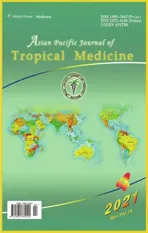How much will be the cost for universal coverage of COVID-19 vaccination and how shall it be financed?
2021-04-29MohammadMeskarpourAmiriHosseinAminiAliMehrabiTavana
Mohammad Meskarpour-Amiri, Hossein Amini, Ali Mehrabi Tavana
1Health Management Research Center, Baqiyatallah University of Medical Sciences, Tehran, Iran
2Department of Epidemiology, School of Health, Iran University of Medical Sciences, Tehran, Iran
Given the failure to find a definitive cure for COVID-19, the only hopes for controlling the pandemic right now are vaccine production and universal vaccination. Therefore, vaccine is vital to the prevention and control of COVID-19 outbreak and it will support global health security. So far, many efforts have been made to develop, manufacture, and stockpile the coronavirus vaccines that have given everyone hope[1-3]. The last attempts by the world's premier biopharmaceutical companies have given world the hope to end the pandemic, with the successful results of the Phase 3 clinical trial of their coronavirus vaccine[4,5]. However, making COVID- 19 vaccine is not the final step to end the pandemic. There will still be many questions including how much it will cost to carry out this extensive vaccination. Also, the price of COVID-19 vaccine, its pricing method, safety duration, effectiveness, and the number of booster doses have not yet been determined.
The world population was estimated to have reached 7.8 billion[6].If we consider the price of COVID-19 vaccine at least equal to the average price of a seasonal flu vaccine ($ 36)[7], providing at minimum one dose of vaccine will cost more than $ 276 billion for international community. If the vaccine is not 100% effective or requires booster doses, the cost will be doubled or tripled. The recent reports of vaccine by the world's premier biopharmaceutical companies showing an effectiveness of 90%-95% with two doses required[4,5,8,9], it means that more than 600 billion dollars is needed to only finance the vaccine vials required for universal vaccination. On the other hand, both of the vaccines are mRNA vaccines which require cold chain for vaccination [at least -20 ℃(-4 °F) for use up to six months], which greatly increases the cost and logistics issues. Such a cost and logistic requirement may make it impractical for massive vaccination in Africa and other developing regions. Inactivated vaccines[8,9], which offer a potential economical alternative for use, will give more hope to ensure universal vaccination.
Financing the cost of COVID-19 vaccination is impossible to lowincome countries and will be catastrophic to lower-middle-income countries. According to our estimations (Table 1), financing at least one dose of vaccination in Ethiopia, Guinea, Niger, and Chad will exceed these countries' total health expenditure in one year (Table 1).Countries such as Afghanistan, Pakistan, India, and Ghana have to spend more than half of their total health expenditure on one dose of vaccine, which is unaffordable.
Considering that public vaccination may not be financially possible at the first stage, necessary planning should be done to prioritize the population from now on. It is suggested as follows: (1) Age group who are mostly at risk should be prioritized. (2) Healthcare workers should be prioritized. (3) Mostly at risk job groups should be prioritized. (4) People infected over the past 3 months and are relatively immunized now may be excluded from first-stage vaccination.
Since COVID-19 eradication requires complete break of infection transmission chain through maximizing vaccination coverage,necessary planning should be done to finance universal vaccination coverage. Incomplete disruption of transmission chain could lead to further mutations of virus and a much more difficult pandemic in the world. Therefore, the following aspects should be considered:(1) Prepayment mechanisms should be developed for the vaccination. (2) Fiscal space for the vaccination should be created.(3) Resource mobilization should be developed for the vaccination.(4) Official development assistance for COVID-19 vaccination should be designed.
Universal immunization for COVID-19 will be a global health and development success. In this regard, the responsible international organizations and institutions including the World Health Organization, International Monetary Fund, and international nongovernmental organizations, should already plan to mobilize all human and financial resources to finance and implement a public vaccination for COVID-19. Also, since the implementation ofuniversal vaccination is both time consuming and costly, before its implementing, the experiences of successful countries and regions in controlling the epidemic (such as Vietnam, Taiwan, etc.) should be identified and made available to health policy makers in different countries. That is where the responsibility lays national efforts and unprecedented international cooperation to protect humanity health facing the pandemic.

Table 1. Estimated vaccination cost for universal COVID-19 vaccination in selected countries.
Conflict of interest statement
The authors declare that there are no conflicts of interest.
Authors’ contributions
The conceptualization was done by A.M.T. The resource and drafting of the manuscript were carried out by M.M.A., H.A.and A.M.T. The writing review and editing were performed by M.M.A. The supervision was done by H.A. and A.M.T. The whole manuscript was read and approved by all authors.
杂志排行
Asian Pacific Journal of Tropical Medicine的其它文章
- Expert consensus on emergency medicine procedure optimization guided by routine prevention and control strategy for COVID-19
- COVID-19 vaccination intention among healthcare workers in Vietnam
- Clinical outcomes of moderate to severe COVID-19 patients receiving invasive vs.non-invasive ventilation
- Clinical outcomes of hospitalized patients with chikungunya fever: A retrospective analysis
- Severe dengue associated with aseptic meningitis, acute kidney injury, and sudden sensorineural hearing loss: A case report
- Isolation of Kytococcus schroeteri from the brown rat Rattus norvegicus
